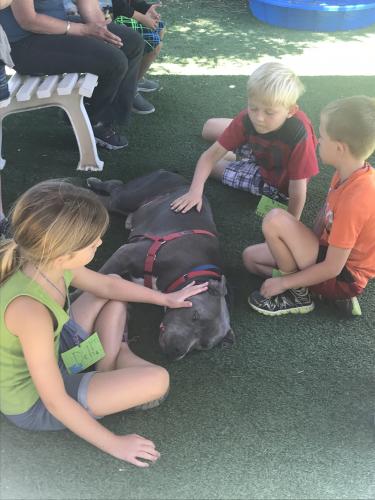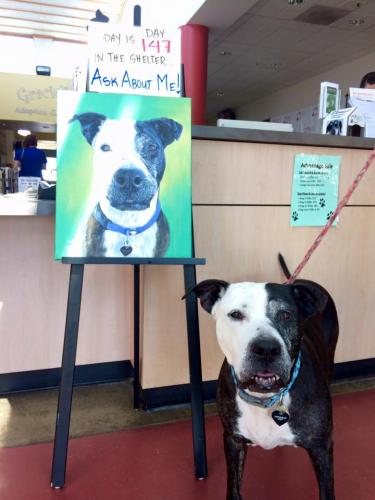You Can’t Hurry Love
Why do some animals stay so long at the shelter?
You have seen the posts and videos from various shelters across the country:
“Soley has been waiting 165 days for his new family!”
“Amy has been with us for MONTHS looking for a home!”
But why do these amazing and wonderful pets spend so long in the shelter? Why are they getting overlooked? Unfortunately, there is usually not one simple answer.
“We know that there are many barriers to adoption. Some are real – age, health, size, activity level. Others are based on misinformation and stereotypes – mostly about gender and breed.” – Kenn Altine, CEO Sacramento SPCA
There are many possible reasons an animal may be overlooked by potential adopters. Here are just a few:
Age 
Puppies and kittens will always have a high demand and often are adopted within hours (or minutes!) of opening our doors. Middle aged and senior pets have a more difficult time. Adopters may not be looking for a dog or cat who only has a few years left before they pass the rainbow bridge. They also may be nervous about potential medical bills that can arise as an animal ages. Families with children may want to raise a puppy, assuming that it’s easier to train a puppy to be good with kids than adopt an adult or senior.
Did you know? That’s not always the case! Adopting an adult or senior dog with a history of living with children may be easier than training a puppy. All the kid and dog cuddles without all the accidents, shoe eating, and late-night whining!
Breed
We get it – most people have a favorite breed of dog or cat. Perhaps you grew up with Dachshunds, have had them all your life, have a tattoo of a Dachshund and named your first child Doxie. (Well, maybe not that one!) While shelters do receive purebred dogs and cats – around 25% of dogs in shelters are purebred – the mutt still leads the pack. We often don’t know an animal’s exact mix and take an educated guess based on looks and behavior. So while we know you love Dachshunds, maybe you could take a chance on that Chihuahua/Dachshund mix! He has just as much love to give AND you’d be saving a life in the process.
First Impression 
So you’ve made it down to the shelter. Welcome! As you walk through the kennels, you can hear a booming bark from the other side of the room. You come up to the kennel and see a large dog barking…nonstop. Yikes! You don’t want a barker! And then keep searching down the line.
What you might not know is that dog is an AMAZING dog and very quiet – when he’s not in the kennel. Many of our dogs and cats are wonderful companions and very well behaved once they are out of the shelter environment. It’s so important to give an animal a chance by taking them out of the kennel, or even talking to a staff member or volunteer to see how they act on their daily walks or out at our events!
“The stress of the environment can cause animals to exhibit behaviors that discourage adopters – barking at people walking by, jumping up against the kennel door with excitement and even hiding in the corner or under a blanket. The animal most likely does not exhibit these behaviors in a home environment, but people only see them in the stressful situation.” - Kenn Altine, CEO Sacramento SPCA
Health 
Nearly 1 in 5 animals that come to the Sacramento SPCA require some sort of medical treatment prior to adoption. It could be as simple as a hot spot, or as advanced as blood work, a dental with extractions or even a leg amputation! If a potential adopter has not experienced an animal with medical conditions before, those words can sound intimidating. Why take on an animal that’s already “broken?” We like to think of it a different way. These animals have received their annual “tune-up”…FREE OF CHARGE! Our adoption fees do not increase based on the level of care a particular animal receives. So for the $110 adoption fee, you may be adopting an animal that received thousands in veterinary services. All animals will require veterinary care at some point in their lives and usually it’s a mystery. When you adopt a dog or cat who has already received a medical work up, you know what you’re in for!
Any of these reasons alone may give a potential adopter pause when looking to adopt a new pet. Add them together and now that cat or dog has several odds stacked against them. Our sweet Amy, with us for several months, checked all four boxes: 10 years old (age), hypothyroidism (health), a Pittie mix (breed) and “talked” nonstop in her kennel (initial impression). But a family came down to see her several times and fell in love. She’s now doing great in her new home.
Adopting a pet can be a wonderful experience and change your (and the pet’s!) life for the better. Next time you visit a shelter, perhaps take a second look at the animal you originally passed by. They could be the one.


Comments
Post new comment